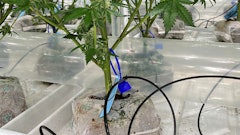
Minnesota’s seed-to-sale tracking system for its medical cannabis industry will be provided by Metrc, a Florida-based company that has become somewhat synonymous with regulatory compliance in many state markets.
Metrc’s system offers a radio-frequency identification (RFID) tag model, where each individual plant and product is traceable through patented RFID technology, allowing for data tracking for each plant, inventory control and cultivation management. The system helps ensure accurate reporting of sales as well as product safety for consumers.
The company’s agreement with Minnesota is its 19th government contract nationwide, it announced March 17.
Deploying an accurate inventory management system also helps to combat the illicit market, according to Metrc.
“As the Minnesota Medical Cannabis Program continues to evolve, we are excited to bring our state-of-the-art track-and-trace platform, which will enable state regulators to conveniently and securely track, store and retrieve millions of data points from operators around the state,” Metrc CEO Jeff Wells said in a statement. “Metrc is eager to work side-by-side with the Department of Health and partner with existing operators within the state to create an effective and well-regulated medical marketplace that Minnesota’s regulators, patients and operators can truly trust.”
The announcement comes on the heels of a new law allowing patients enrolled in Minnesota’s medical cannabis program to access flower, which went into effect March 1. Before, the state’s dispensaries could only sell medical cannabis in pill, oil and topical form.
With the addition of Minnesota, Metrc now holds government contracts in every region of the U.S., including implemented systems in Alaska, California and Washington, D.C.
The Minnesota contract came a week after the company secured a contract with New Jersey for its forthcoming adult-use market. While New Jersey has had a legal medical cannabis program since 2010, the partnership with Metrc will be the first time the state has contracted a provider to implement a centralized track-and-trace system, according to the company.
While Metrc did not offer any profit estimates the company stands to gain from providing its system to cannabis operators in those state-legal markets, $12 million was a figure associated with the company’s contract in Oklahoma during an injunction in a class-action lawsuit that was lifted last month.
The Oklahoma Medical Marijuana Authority (OMMA) and Metrc were co-defendants in the suit (filed last year), with more than 10,000 of the state’s licensed cannabis businesses gaining a restraining order of a track-and-trace rollout through legal representation, arguing a contract with Metrc would create an estimated $12-million tracking system monopoly in the state.
An agreed order issued Feb. 25 allowed Metrc to move forward with providing the tracking system for the state’s medical program.
While the regulatory frameworks are diverse in the 19 states Metrc holds contracts with, the company has indicated that each jurisdiction shares the common goal of ensuring safe and legal cannabis markets.

























